Aug 07, 07 · By induction, then, if f (x)= xn, f' (x)= nxn1 for any positive integer n It is easy to see that the derivative of x0 is 0 (x1)= 0 since x0= 1 is a constant To find the derivative of xn, write it as 1/xn and use the quotient rule To find the derivative of x rIf F(x)=x has no real solution then also F(F(x)=x has no real solutionMar 03, · If f (x) = x1/x1 then find the value of f (2x) Find the answer to this question along with unlimited Maths questions and prepare better for JEE examination

Solved A Find The Critical Number S And The Intervals Wh Chegg Com
F(x)=x-1/x 1 then find f f(x)
F(x)=x-1/x 1 then find f f(x)-Calculus Find the Derivative f (x)=1/x f (x) = 1 x f ( x) = 1 x Rewrite 1 x 1 x as x−1 x 1 d dx x−1 d d x x 1 Differentiate using the Power Rule which states that d dx xn d d x x n is nxn−1 n x n 1 where n = −1 n = 1 −x−2 x 2 Rewrite the expression using the negative exponent rule b−n = 1 bn b n = 1 b nIf X > 1 F(1) F(314) F(06) = 8) What can be inferred about A if int (A) = A ?




Ex 1 3 6 Show F X X X 2 Is One One Find Inverse Of F
If f (x) = x1/x1 then f (2x) is ?Answer to If e^{f(x)} = 1 x^3, then find f'(x) By signing up, you'll get thousands of stepbystep solutions to your homework questions YouApply the product rule for differentiation (f\cdot g)'=f'\cdot gf\cdot g', where f=x^2 and g=e^x The power rule for differentiation states that if n is a real number and f(x) = x^n, then f'(x) = nx^{n1} The power rule for differentiation states that if n is a real number and f(x) = x^n, then f'(x) = nx^{n1}
It must be in terms of f (x)∵ ƒ(x) = ( x 1 ) / ( x 1 ) (1) ∴ ( x 1 ) ƒ(x) = x 1 ∴ x ƒ(x) ƒ(x) = x Thank you for registering One of our academic counsellors will contact you within 1 working dayClick here👆to get an answer to your question ️ If f(x) = x 1x 1(x≠ 1) then fofofof(x) =Jan 28, · Misc 3 If f R → R is defined by f(x) = x2 − 3x 2, find f(f(x)) f(x) = x2 − 3x 2 f(f(x)) = f(x)2 − 3f(x) 2 = (x2 – 3x 2)2 – 3(x2 – 3x 2
Top papgust Community Manager Posts 1537If for Nonzero X, Af(X) Bf ( 1 X ) = 1 X − 5 , Where a ≠ B, Then Find F(X) CBSE CBSE (Commerce) Class 11 Textbook Solutions 79 Important Solutions 14 Question Bank Solutions 6793 Concept Notes & Videos 318 Syllabus Advertisement Remove all ads If for Nonzero X, Af(X) Bf ( 1 X ) = 1 X − 5 , Where a ≠ B, Then Find F(X)Aug 27, 17 · If F(x) = (x1)/(x1), find (f of f)(x)
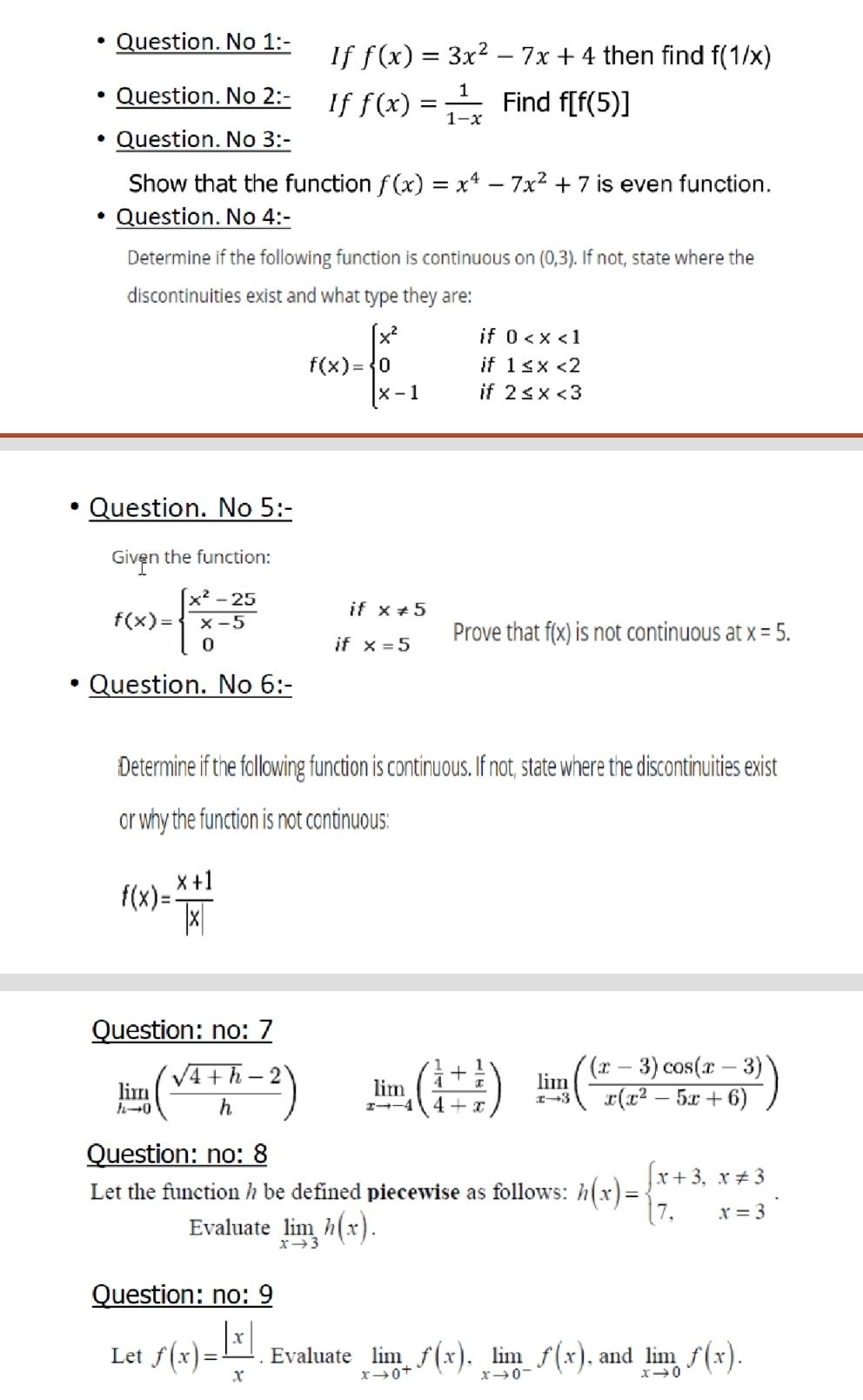



Solved Question No 1 If F X 3x2 7x 4 Then Find Chegg Com




If F X X 1 X 1 Then Show That F 1 X F X Ii F 1
Click here👆to get an answer to your question ️ If f (x) = x 1/x 1 ( x ≠± 1 ) then find i) (fofof)(x) ii) (fofofof)(x)Login Create Account Class12science » Maths Class12commerce » Maths Class12humanities » Maths Inverse Trigonometric Functions If f(x) = x^3 x^2f'(1) xf''(2) f''"(3) then find the value of f(2) Share withIt is a special method used to find the derivative of a definite integral without integration If the definite integral is B(x) ∫ A(x) f(x)dx ∫ A ( x) B ( x) f ( x) d x , then the following




Let F X 2x 3 X 3 If Function F One One And Onto Is F
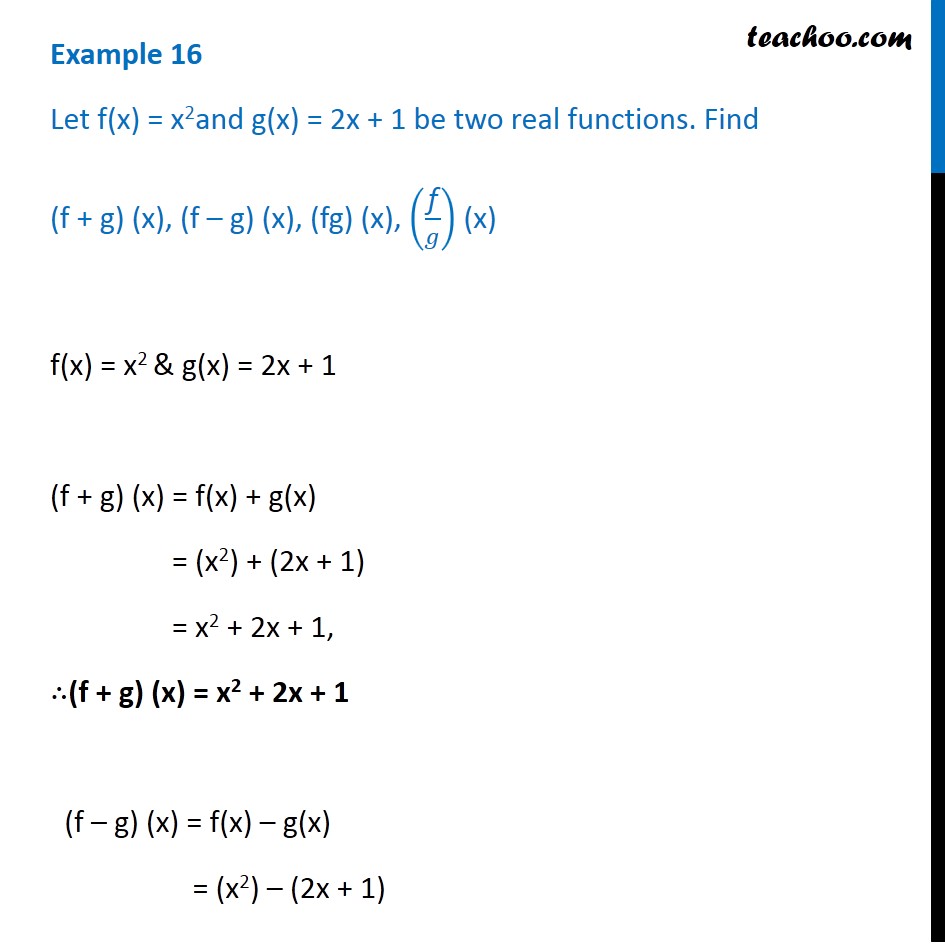



Example 16 Let F X X2 And G X 2x 1 Find F G Fg F G
Now what we know first is we'll take the derivative of F with respect to X, and what we do here is we immediately take the exponents and move it out in front When we do that, we get a negative too Times X and then we get a new exponents We take the old exponents and subtract one, so it's gonna give us a negative three, which means that we endApr 30, 18 · If f R → R is a function defined by f(x) = 3x – 2 1 Show that f is oneone 2 Find fof(x) 3 Find the inverse of f if existsOct 28, · If x ≠ 1 and f (x) = (x1) / (x1) is a real function, then fff (2) is Sarthaks eConnect Largest Online Education Community




If F X Log 1 X 1 X Then Show That F X F Y F X Y 1 Xy Brainly In




D Teaching Mathematics Mathematical Analysis
If X 1 if X 1 (2x 5;As you can see, this function is split into two halves the half that comes before x = 1, and the half that goes from x = 1 to infinity Which half of the function you use depends on what the value of x is Let's examine this Given the function f (x) as defined above, evaluate the function at the following values x = –1, x = 3, and x = 1Jan 28, · Transcript Ex 13, 13 If f R → R be given by f(x) = 〖"(3 – x3)" 〗^(1/3) , then fof(x) is (A) "x" ^(1/3) (B) x3 x (D) (3 – x3) f(x) = 〖"(3 – x3




Misc 4 Show F X X 1 X Is One One Onto Miscellaneous




Find C If Lmvt Is Applicable For F X X X 1 X 2 Xepsilon 0 12
Differential Equation f ′ ( x) = f ( x) ( 1 − f ( x)) Find the function f (x) such that f' (x) = f (x) (1f (x)) and f (0) = 1/7 (Use f for f (x) in your equation) Which cancels out my "f"Find the Domain and Range f (x)=1/x f (x) = 1 x f ( x) = 1 x Set the denominator in 1 x 1 x equal to 0 0 to find where the expression is undefined x = 0 x = 0 The domain is all values of x x that make the expression defined Interval NotationDec 10, · Solution (3) f (x) = 1 – x / 1 x (f (cos 2θ)) = 1 – (cos 2θ) / 1 (cos 2θ) = 1 – (1 – 2 sin 2 θ) / 1 2 cos 2 θ – 1 = 2 sin 2 θ / 2 cos 2 θ = 2 tan 2 θ (f (cos 2θ)) = 2 tan 2 θ




If A 2 1 0 1 2 And F A B Is A Surjection Defined By F X X 2 X 1 Then Find B
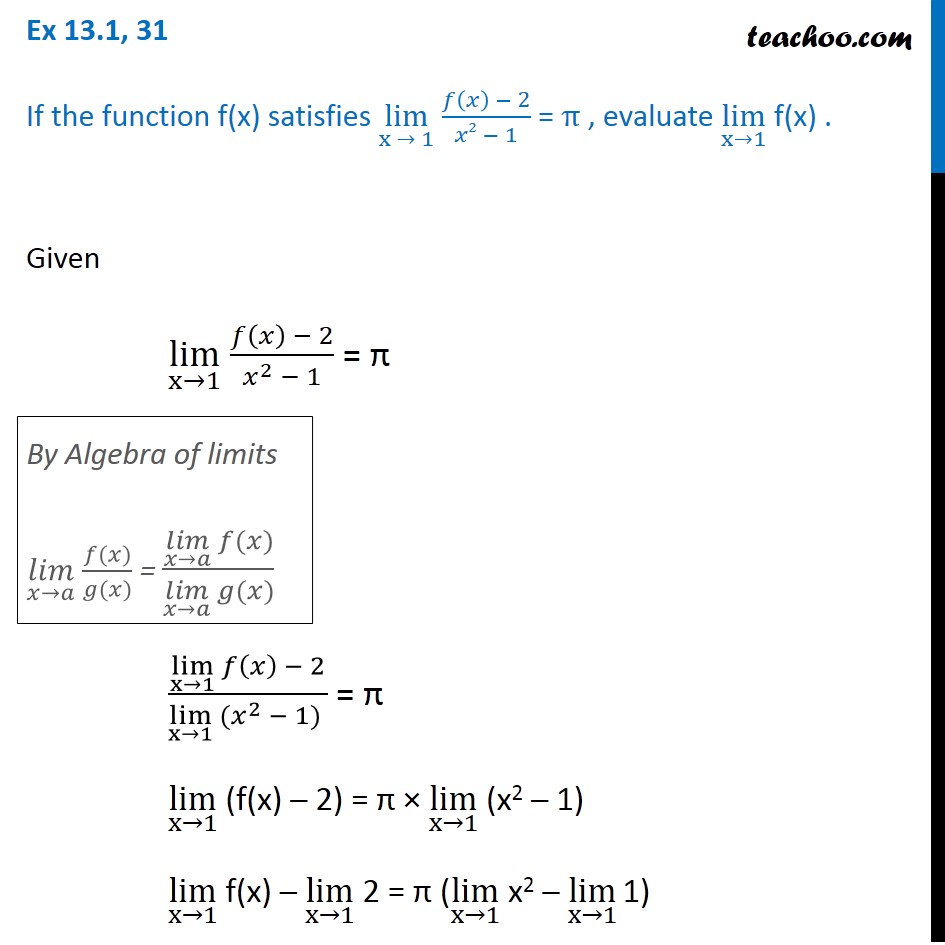



Ex 13 1 31 If Function F X Lim X 1 F X 2 X2 1 Pi
Given f (x) = 3x 2 – x 4, find the simplified form of the following expression, and evaluate at h = 0 This isn't really a functionsoperations question, but something like this often arises in the functionsoperations contextDec 08, 12 · You can see from Miles answer that, if we ignore 0, then the operation σ(x) = x works for f(x) = 1/x You can check 16 (for D = nonzero reals), with A being the positive numbers, and B being the negative numbers yourselfJul 06, 08 · F(x)=1x F(1x) = 1(1x)=x They give you different results so this functions is not that function that gives you the same result using x or (1x) So we plug in x1 for x for all the equations Then what are we looking out for that gives D as the answer?




Ex 1 3 6 Show F X X X 2 Is One One Find Inverse Of F




Maths Summing Series Homeworkhelp
Jul 26, 18 · Find the value of X X= If a = 1, b = 3,c = 2 then find the value of (i) 2a 3b 4c 4 For any positive integer n , prove that n square n divisible by 6Prove that Add 19 ( 3 ), please include explanation thank you!Jan 12, 19 · If f(x) = x^3 x^2f'(1) xf''(2) f'' NCERT Solutions;Question Let F (x) = X2 2 If X < 1 (x − 2)2 If X ≥ 1 (a) Find The Following Limits (If An Answer Does Not Exist, Enter DNE) Lim X → 1− F (x) = Lim X → 1 F (x) =
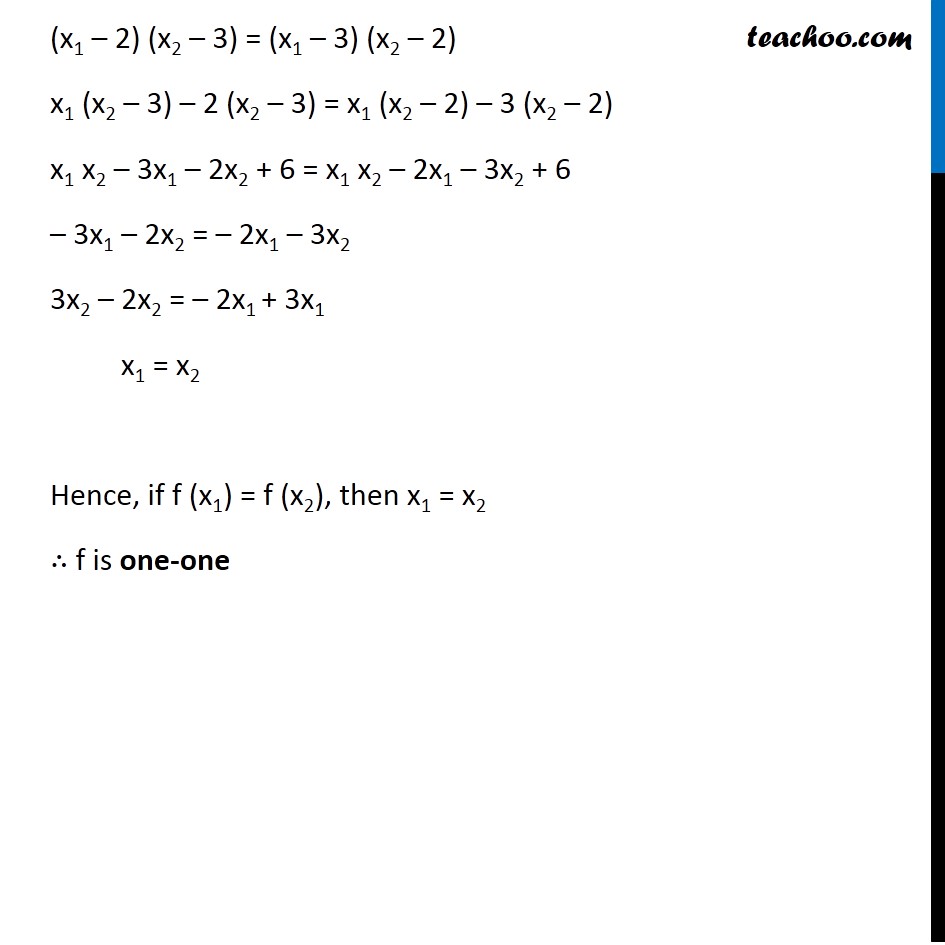



Ex 1 2 10 F X X 2 X 3 Is F One One Onto Class 12




If F Rtor G Rtor Are Defined By F X 4x 1 G X X 2 2 Then Fi
Learn how to solve product rule of differentiation problems step by step online Find the derivative using the product rule (d/dx)((x1)(x^22x2)^05) Apply the product rule for differentiation (f\\cdot g)'=f'\\cdot gf\\cdot g', where f=x1 and g=\\sqrt{x^22x2} The power rule for differentiation states that if n is a real number and f(x) = x^n, then f'(x) = nx^{n1} The derivativeGiven f (x) = 1/x, so replace x by f (x) because function can take any defined real values It will give f (f (x)) = 1/f (x) Now we know that f (x)=1/x, keep this value in above equation We have f (f (x))= 1/ (1/x) ie f (f (x))= xD Page NoData1Droveprove that 3 √5 is anirrational Number pls answer this question




Let F X X Root 1 X2 Show That Fofof X X Root 1 3x2 Brainly In




If F X Sqrt X 2 1 G X X 1 X 2 1 And H X 2x 3 The
Sep 25, 11 · Get an answer for 'Find the function f such that `f'(x) = f(x)(1f(x))` and `f(0) = 1/2` ' and find homework help for other Math questions at eNotes Search this site Go iconquestionOct 23, 15 · f (x)=(3x7)^2 then f (1) =Jul 27, 11 · surely you aren't actually that munted you spasticated flopper?




Solved A Find The Critical Number S And The Intervals Wh Chegg Com




30 If Function F X Dfracx3x2 See How To Solve It At Qanda
Let f(x)= (x1/x1) then f(f(x)) is (A) (1/x) (B) (1/x) (1/x1) (D) (1/x1) Check Answer and Solution for above question from Mathematics in Se TardigradeIf f(x) = 1/x^2, find f'(3) using the limit definition so I try setting it up where f(3h) = 1/(3h)^2 and f(3) = 1/9, but then I run into a number of dead ends as I fail to find an equation that is solvable when h = 0 What I've tried Cross multiply to find common denominator I get a zero numerator Desmos confirms f'(3) is nonzero2 If f ( x) = 1 x 2 4 x 4 − 4 x 4 4 x 3 4 x 2 4 x 3 2 x 2 , then f ( 1 2) is equal to 3 The domain of the function 4 I f f ( x 1 2 x − 1) = 2 x, X ∈ N, then the value of is equal to f ( 2) is equal to 5 If n ( A) = 5 and n ( B) = 7, then the number of relations on A × B is 6




Let F X Be Defined In 0 1 Then The Domain Of Definition




F X 2x 1 X 2then Showed F Tan Theta Sin 2 Theta Brainly In
Assume f ( x 1) = f ( x 2) Then x 1 2 1 = f ( f ( x 1)) = f ( f ( x 2)) = x 2 2 1 and so x 2 = ± x 1 Then from f ( f ( − x)) = f ( f ( x)) we conclude that f ( − x) = ± f ( x) for all x Define g 0, ∞) → 0, ∞) by g ( x) = f ( x) For x with g ( x) = f ( x) we have9) Find f(f(4)), given f(x) = 4 3X, if X < 2 and f(x) = 3 X, = if XAbout Press Copyright Contact us Creators Advertise Developers Terms Privacy Policy & Safety How works Test new features Press Copyright Contact us Creators




If F X X 1 X 1 Then The Value Of F F 3 Is




If F X 1 1 X Then Find F F 1 X Brainly In
For example, if f is a function that has the real numbers as domain and codomain, then a function mapping the value x to the value g(x) = 1 / f(x) is a function g from the reals to the reals, whose domain is the set of the reals x, such that f(x) ≠ 0 The range of a function is the set of the images of all elements in the domain< 1 7) If F(x) = then 2 lint (x 4);Steps for Solving Linear Equation f ( x ) = 1 \frac { 2 } { x 1 } , s f ( x) = 1 − x 1 2 , s Multiply both sides of the equation by x1 Multiply both sides of the equation by x 1 fx\left (x1\right)=x12 f x ( x 1) = x 1 − 2 Use the distributive property to multiply fx by x1




Solve Y 1 Xy Dx X 1 Xy X 2y 2 Dy 0 Mathematics Stack Exchange




Misc 2 If F X X2 Find F 1 1 F 1 1 1 1 Chapter 2
Given f (x) = 1/x , so replace x by f (x) because function can take any defined real values It will give f (f (x)) = 1/f (x) Now we know that f (x)=1/x, keep this value in above equation We have f (f (x))= 1/ (1/x) ie f (f (x))= x ThanxFeel free to ask any doubtsDivide f2, the coefficient of the x term, by 2 to get \frac{f}{2}1 Then add the square of \frac{f}{2}1 to both sides of the equation This step makes the left hand side ofUnlike Example 1, f(x) is unbounded in any interval containing 0, so the Riemann integral is undefined If f(x) is the function in Example 1 and F is its antiderivative, and {} is a dense countable subset of the open interval (,), then the function




Inverse Functions Solutions Examples Videos
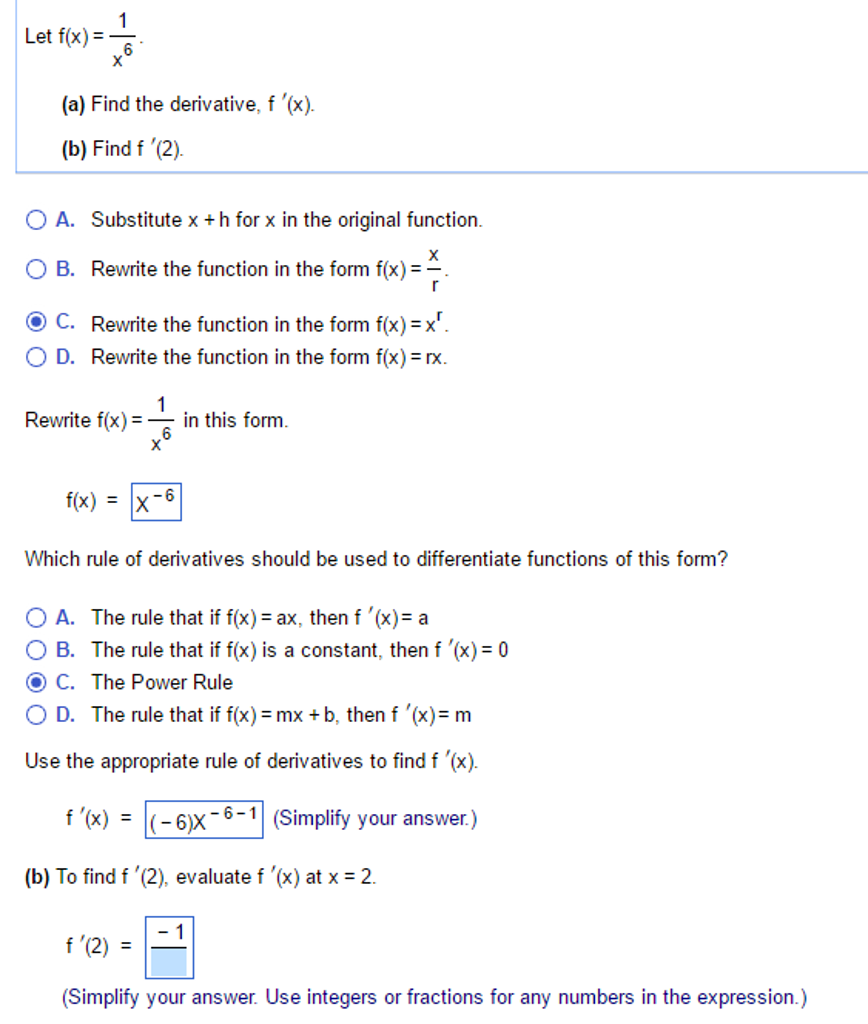



Let F X 1 X 6 Find The Derivative F X Find Chegg Com
Find f f"(x) = 1/x^2 be equal to negative the anti derivative of one over X is actually going to be the natural log of the absolute value of X So then based on that, what we end up having is um plus C X Class D Um And the reason why we have plus six is because this is some constant So it's anti derivative of B plus C XLet F (X) =`{ (1 X, 0≤ X ≤ 2) , (3 x , 2 < X ≤ 3)}` Find FofMar 06, 18 · f ∘ f −1 = f (f −1(x)) = 1 1 x = x f −1 ∘ f = f −1(f (x)) = 1 1 x = x f ∘ f −1 = f −1 ∘ f = x Answer link




Misc 3 F X X2 3x 2 Find F F X Chapter 1 Miscellaneous




If The Function F R R Defined By F X 4 X4 X 2 Then Show That F 1 X 1 F X And Hence Deduce The Value Of F 14 2f 12 F 34




If F X 1 1 X Then Find F F X Brainly In
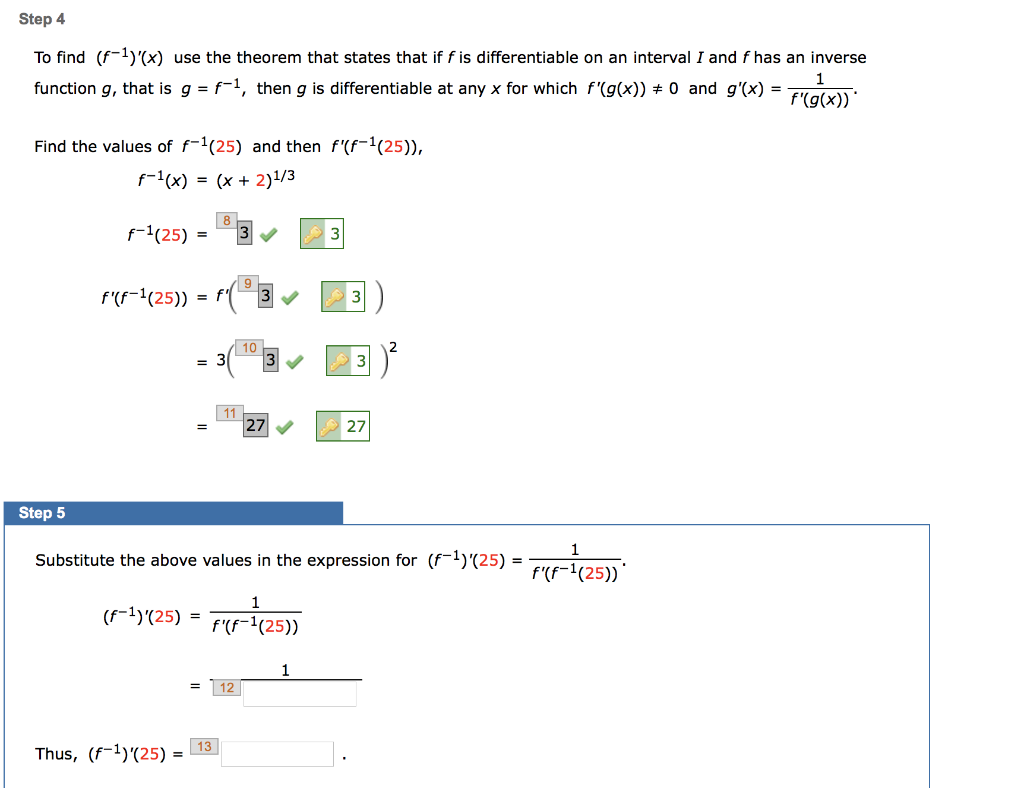



Solved Step 4 To Find F 1 X Use The Theorem That Stat Chegg Com




Example 12 Show That F X X 1 If X Is Odd X 1 If X Is Even




Section 2 7 One To One Functions And Their Inverses Pdf Free Download
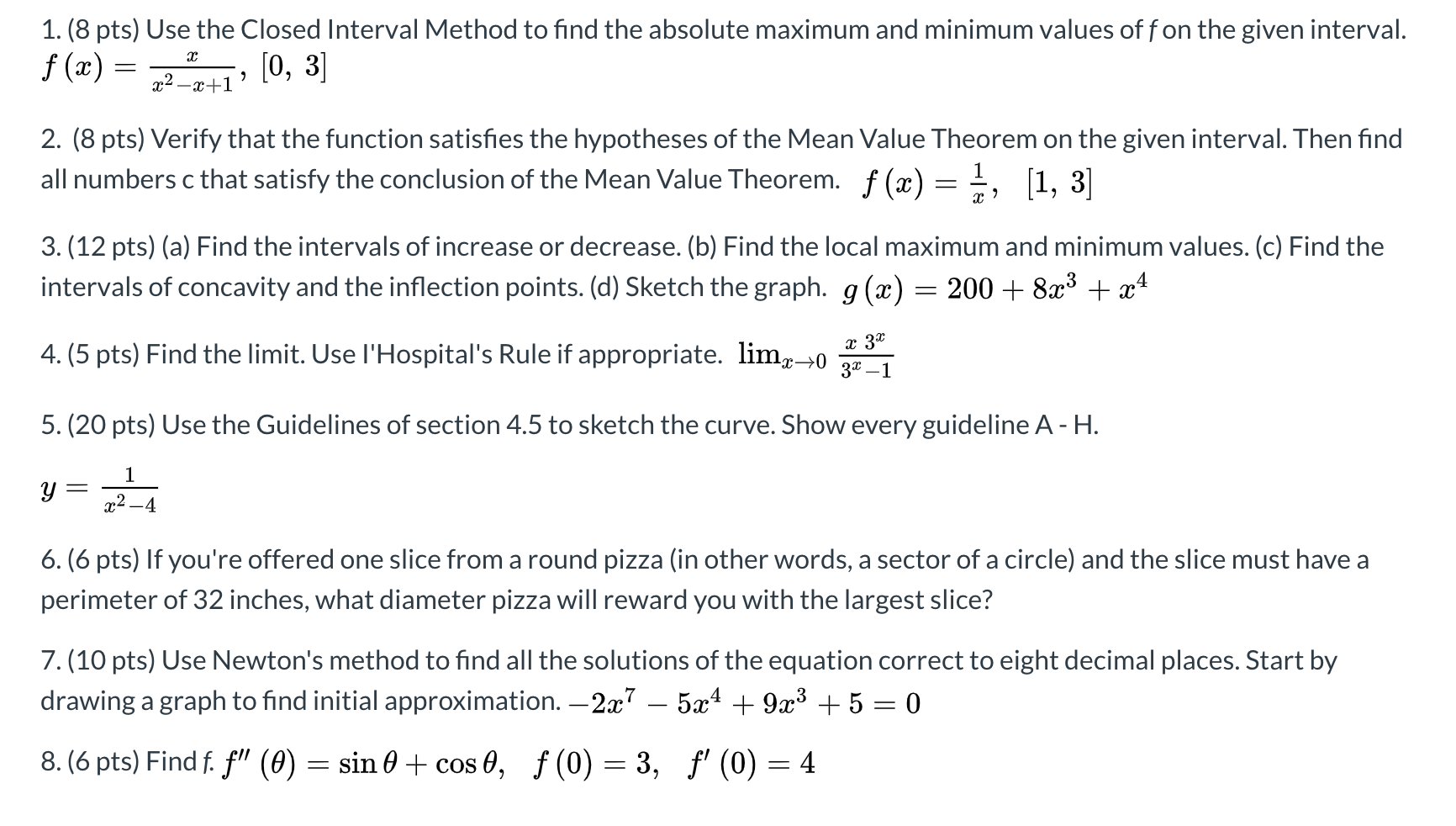



Solved 1 8 Pts Use The Closed Interval Method To Find Chegg Com
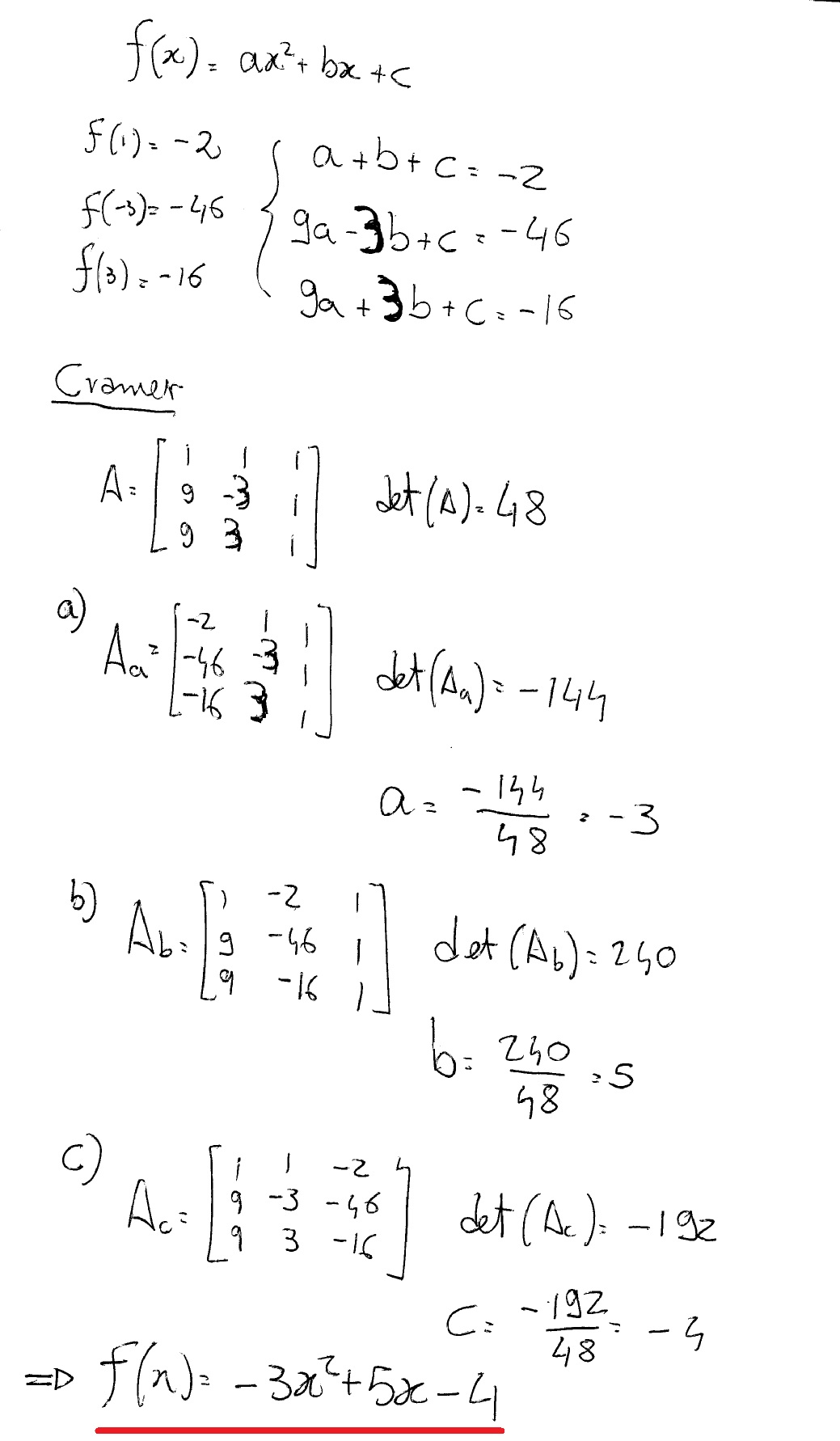



How Do You Find A Quadratic Function F X Ax 2 Bx C For Which F 1 2 F 3 46 And F 3 16 Socratic




Evaluating Composite Functions Video Khan Academy




Ex 1 3 4 If F X 4x 3 6x 4 Show That Fof X X




Find The Domain And Range Of The Function F X 1 1 X 2 X I




Finding Inverse Functions Linear Video Khan Academy




If F X 2f 1 X 3x X Ne 0 And S X In R F X F X Then S Youtube




If F X Log 1 X 1 X Then F X Is I Even Function




If F X X 2 5 And F 0 1 Then F X




Example 23 Let F X 4x 3 Where F N Y Show F Is Invertible




If F X Satisfies The Relation 2f X 1 X X 2 For All Real X Then Find F X Youtube




If F X 1 X 1 X Then Find F F Sin Theta Brainly In
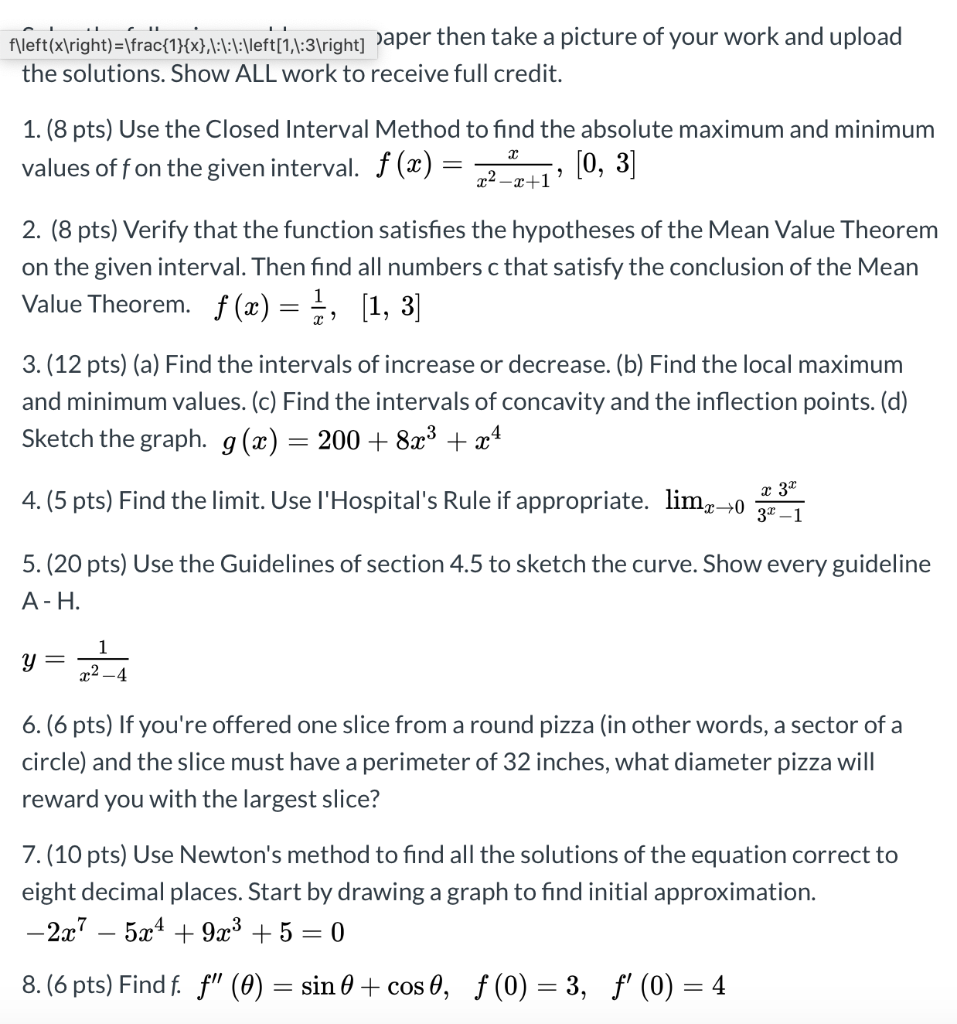



Solved F Left X Right Frac 1 X 1 1 Left 1 1 3 Righ Chegg Com




Inverse Functions And Logarithms Pdf Free Download
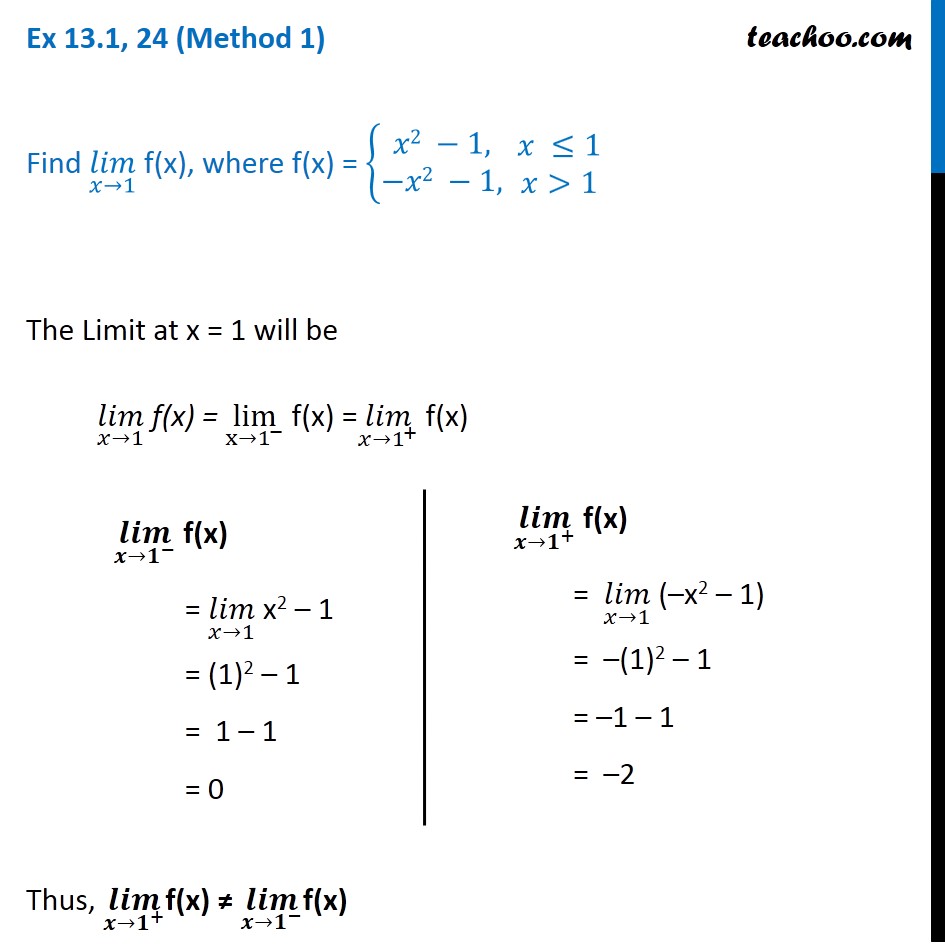



Ex 13 1 24 Find Lim X 1 Where F X X 2 1 X 1 X 2 1




Verifying Inverse Functions By Composition Video Khan Academy




If F X A X N 1 N Where A 0 And N Is A Positive Integer Then F O F X Is




Solved Part A Multiple Choice K U Marks 1 Given Chegg Com




If G X X 2 X X 1 And G F X 4x 2 10x 5 Then Find F 5 4
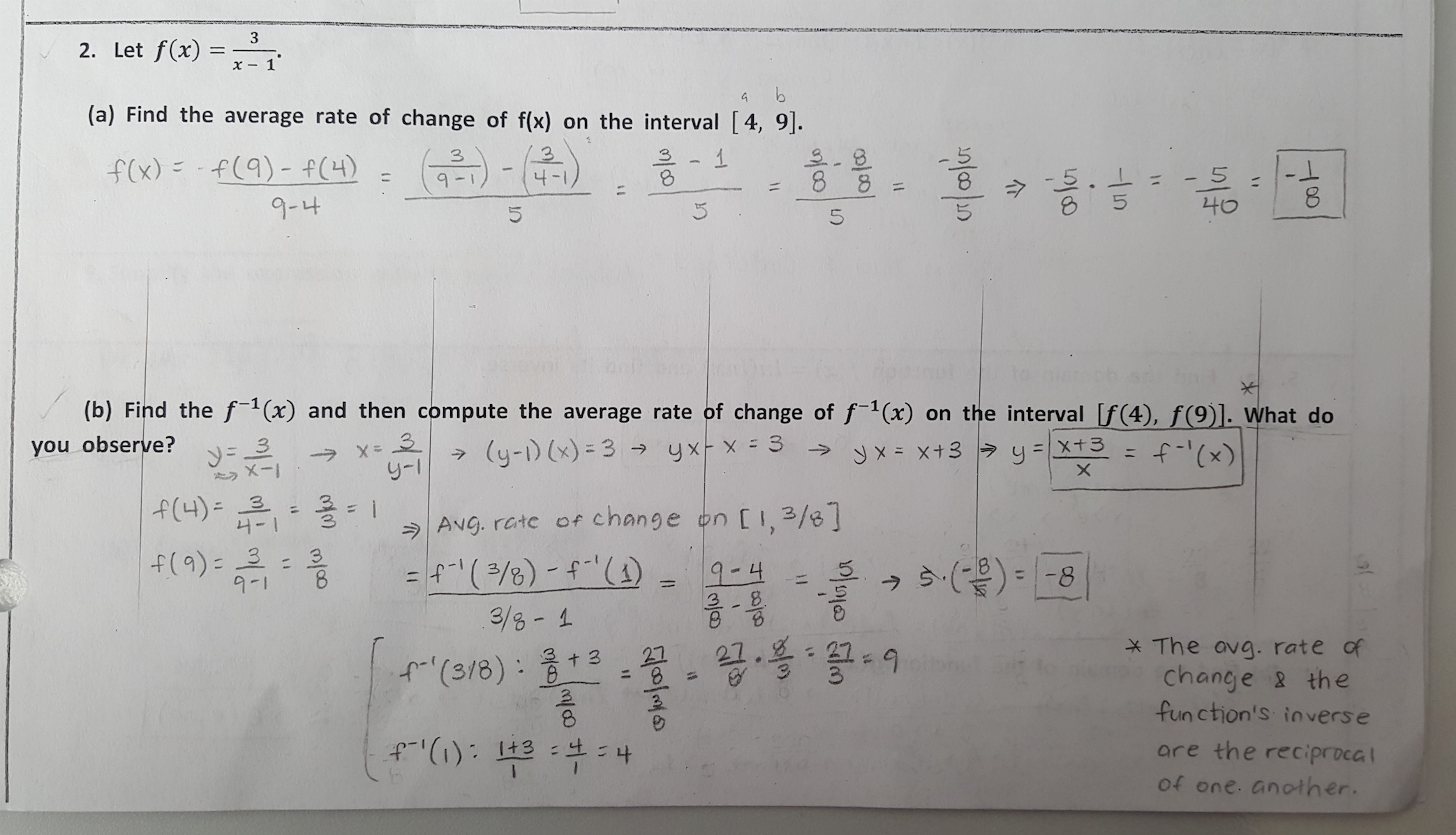



Let F X 3 X 1 Find The Average Rate Of Change Chegg Com




If F X 5x 2 3x 5 And G X X 2 2x 1 Then Find The Value Of G F F 3 Brainly In




Misc 4 Show F X X 1 X Is One One Onto Miscellaneous




If F X 2x 1 3x 2 Then Fof 2 Is Equal To




If F X 1 1 X Then The Derivative Of The Composite Function




Derivatives Of Inverse Functions From Equation Video Khan Academy
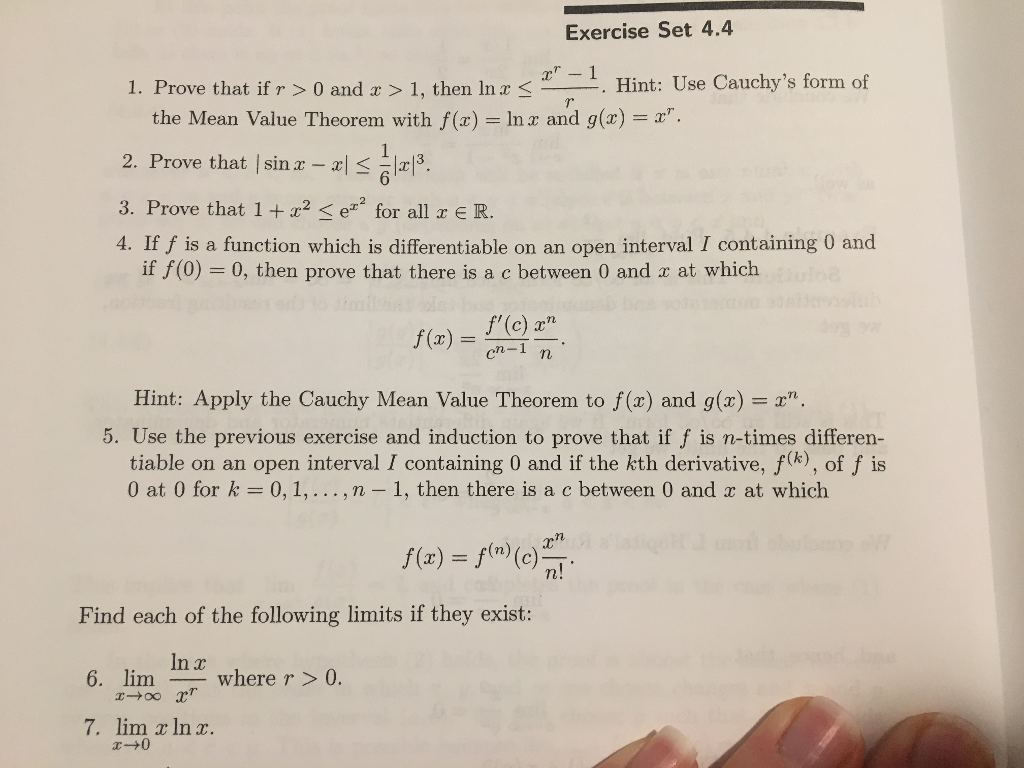



Prove That If R 0 And X 1 Then Ln X Lessthano Chegg Com




If F X Tex Frac X 1 X 1 Tex X 1 Then Find I Fofof X Ii Fofofof X Brainly In
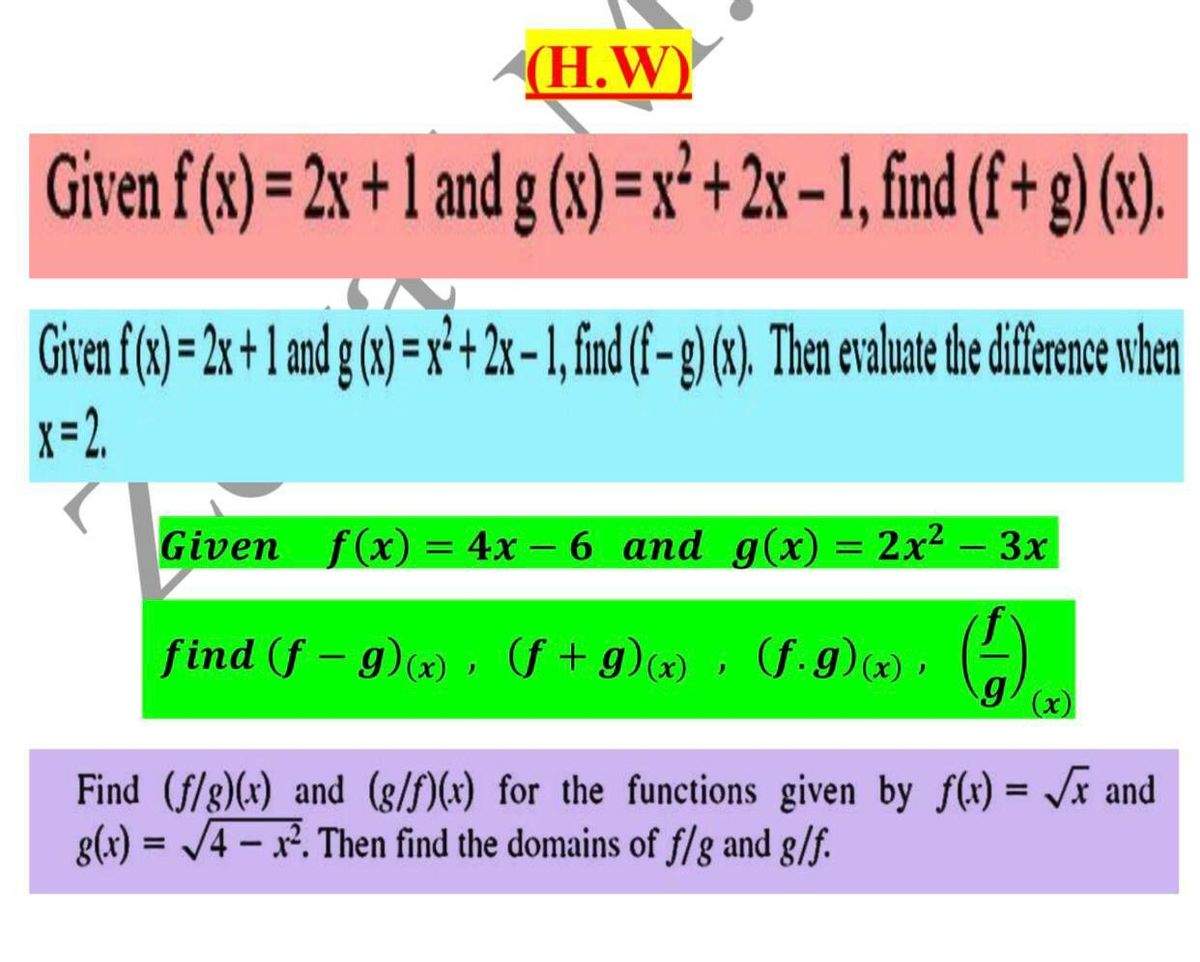



Answered H W Given F X 2x 1 And G X Bartleby




Let A R 3 And B R 1 Consider The Function F A B Defined By F X X 2 X 3 Show That F Is One One And Onto And Hence Find F 1




If The Function F X X 2 1 X 1 When X 1 K When X 1
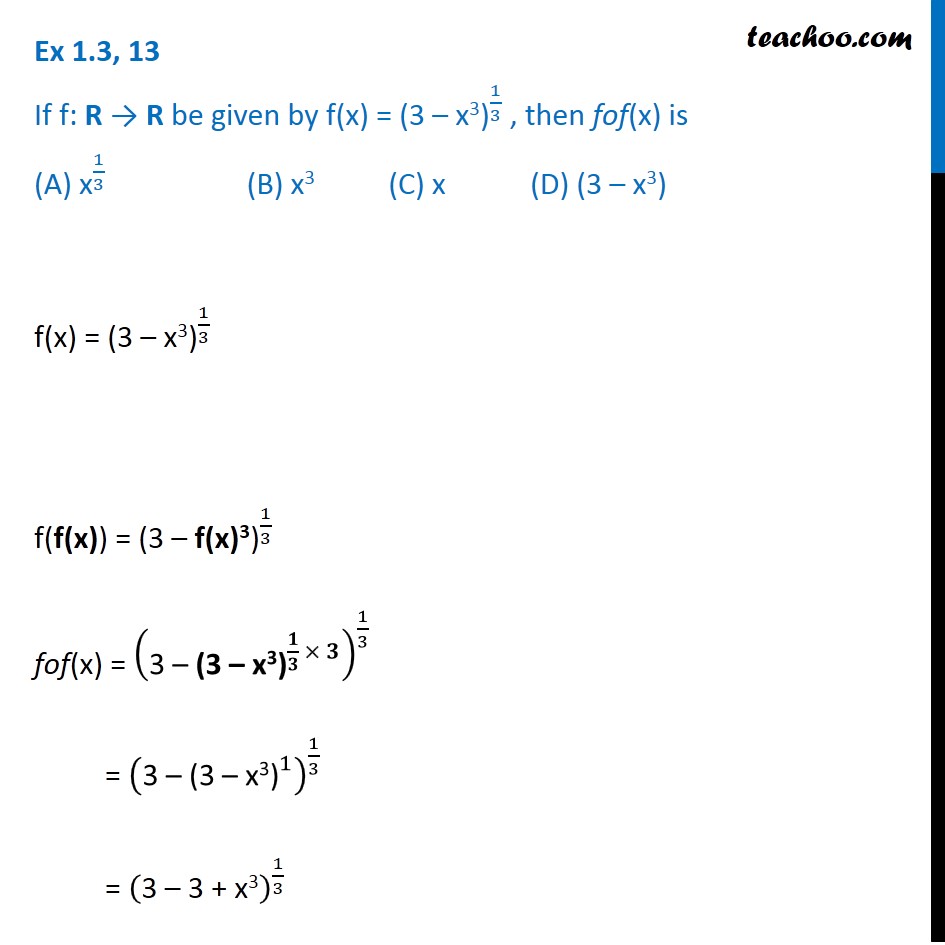



Ex 1 3 13 F X 3 X3 1 3 Then Fof X Is A X1 3




Multiplying Functions Video Functions Khan Academy




If F X 1 1 X Then F F F X Is Equal To




Misc 2 If F X X2 Find F 1 1 F 1 1 1 1 Chapter 2




If G Is The Inverse Of A Function F And F X 1 1 X 5 The




Let F X 1 X 0 X 2 3 X 2 Lt X 3 Then Find Fof Fof Means Brainly In
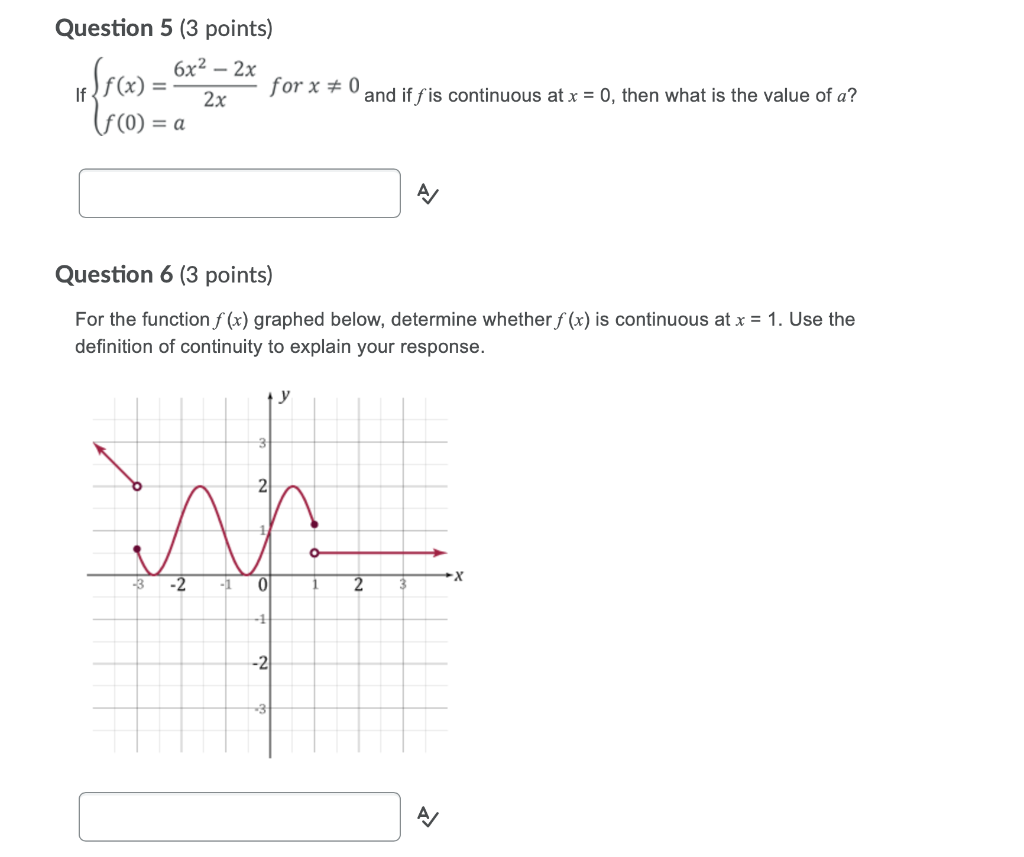



Solved Question 5 3 Points If Ff X 6x2 2x 2x For X Chegg Com




Ex 1 3 6 Show F X X X 2 Is One One Find Inverse Of F




If F X X 1 X Then Number Of Solutions Of F F F X 1




The Domain Of The Function F X 1 Sqrt X X Is A O




If F X 1 X 1 X Then Find F F Sintheta




Pin On Attitude Quotes For Boys
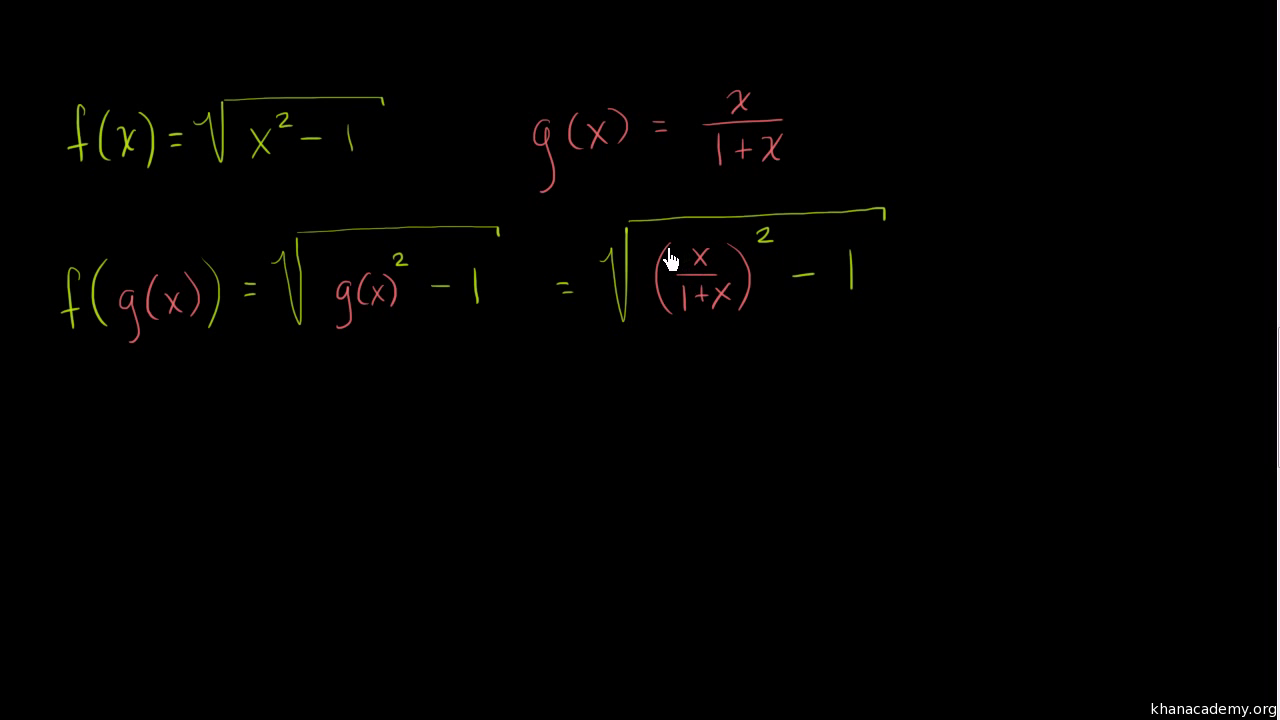



Finding Composite Functions Video Khan Academy




If F X X 1 X 1 X Is Not Equal To 1 Then Show That F F X 1 X Where X Is Not Equal To 0 Brainly In




If F X F 1 X F X F 1 X And F 3 28 Then Find F 4 Youtube




If F X X 3 1 X 3 Then Find The Value Of F X F X




Solve This B C D E X2a X 1 Find F If F X Find If F X Maths Relations And Functions Meritnation Com




If F 1 1 F 1 3 Then The Value Of Derivative Of F F F X




Find F 0 So That F X X 1 Sqrt 1 X Becomes Continuous At




If F X X 1 X 1 Then Find F F X Maths Number Systems Meritnation Com




Find X Such That F X 0 Example 1 Youtube




Finding Decreasing Interval Given The Function Video Khan Academy



0 件のコメント:
コメントを投稿